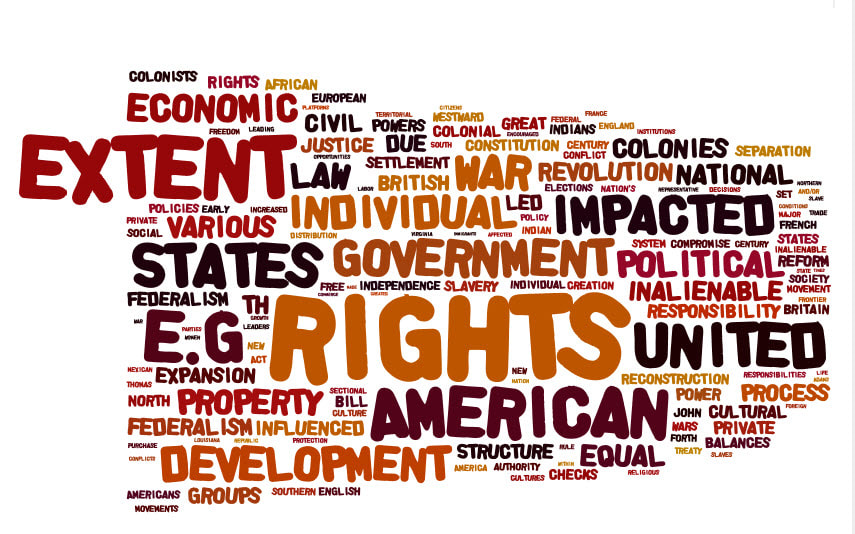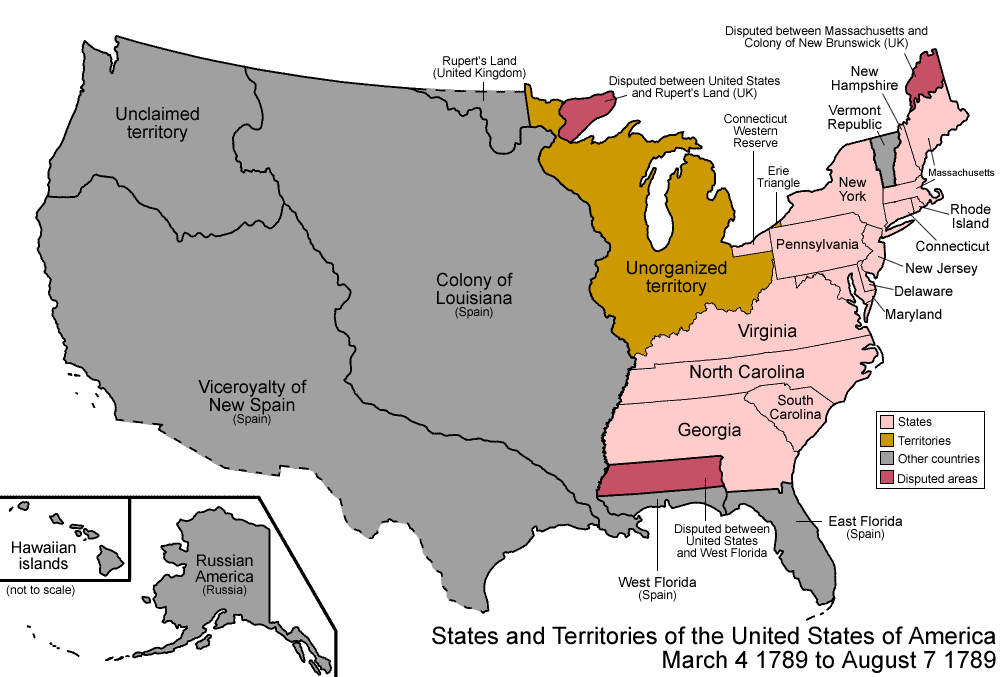University of Houston's Digital History site provides a wealth of hypertext on US history as well as virtual exhibits, topical essays with discussion questions, links to primary sources (landmark documents, court cases, Supreme Court cases, , "explorations" (self-contained research units tending towards the first half of our history, a very cool timeline generator (just enter the start and stop dates), music, lesson plans (created by a 30-year vet), and on and on and on. This could well be the "if I could only take one US history site with me to a desert island" site.
ushistory.org is another excellent online text. Noteworthy are the interviews with top scholars on their topic of specialization. Illustrations make this site stand out from the others and is an excellent resource for more visual learners without overwhelming text.
Shmoop offers an excellent set of resources for an introductory course in high school US history for general level students. What makes the site particularly useful are the levels of depth for each topic (think tiered-instruction). For example, if one were to click "Jamestown", one would find an introductory video accompanying the text (most terms do not have videos). Then after being presented with the basic information, the student on her own, or through a teacher assignment, the student can use the tabs on the left to contextualize Jamestown through the prism of "economy", "politics", "race", "diplomacy", or "gender."
After that exercise, the student can move on to the "timeline" tabbed at the top -- especially useful given the overarching chronological objective in the SCOS -- students can not only contextualize within time but have the usefulness and approach to the creation of a timeline modeled which they can pattern those of their own creation on. Additionally, there are tabs for "people", "photos", and "facts" to provide greater depth on the topic as well as providing a ready resource if the student would like to create a presentation of his own. To further this goal, Shmoop also provides a "best of the web" tab with additional websites, books, historical documents, and more for additional research. Some of the sections provide self quizzes, and where applicable, notation of Common Core objectives (all ELA at the moment). Teachers can even spring for an a la carte or package purchase of additional activities (though, given the teacher's creativity, and ample resources like those below, that's hardly necessary).
Boundless provides online texts for several high school/general college subjects and their US History text isn't bad
The CK-12 text is really a "sourcebook" of primary source documents with accompanying questions. The docs and questions are decent, but in many cases are duplicative of resources found at the Historical Scene Investigation (HSI) site and/or found at the Stanford Historical Education Group (SHEG) site.
Hippocampus has links to about four versions of US History as far as virtual texts, lessons, flash-based lessons with audio. Even if you find some of the materials a bit too difficult for general level classes, definitely click the "US History for AP" link first to check out the short videos useful for all ability groups.
University of Groningen's American History site is useful for its collection of documents curated by era. The collection of critical essays on various topics may also provide useful background for the teacher and could be assigned to advanced students.
History Matters...over 1,000 primary source documents, images, recordings.
Authentic History ...US history told through the prism of pop culture.....images, recordings, etc.
American Memory @ the Library of Congress...over 10 million documents, photographs, amazing collection of maps with fun viewing software, some lessons. Just hard to navigate
Fordham University's Internet Sourcebook. You WILL get lost.
If you still want more, Historical Inquiry has plenty of links and I have more at my "Raw Materials" section of this site
historytools.org has an interesting, eclectic collection of political and religious sources, some with discussion questions.
American Heritage's Fourscore.org site has a worthwhile collection of articles and documents curated by historical era
Carolina K12 Database
Docs Teach "the online tool for teaching with documents, from the National Archives."
Activity/Lesson-based sites
Rottentomatoes for lesson plans: in addition to their fantastic resources for teaching how to think like a historian, teachinghistory.org has excellent, searchable, detailed lesson plan reviews...profit from others' mistakes and successes before you try an untested lesson.
Teachushistory.org is an excellent source of articles and sources from the American Revolution to the eve of the Civil War
Teaching major trials in US history from the Federal Judiciary Center.
Historical Scene Investigations, curated by William & Mary, is a outstanding set of well-packaged lessons, which tilt towards the eras in US History I. The lessons are essentially scripted as "whodunnits", placing the student in the role of historical detective, confronting documents with conflicting truth claims. The teacher will need to closely monitor the detective work as the structure of some of the lessons allows students to get caught in the weeds and miss the big picture. I highly recommend starting with the Case of Sam Smilely as a general introduction into the craft of history. Students will discover that "doing history" entails inference and some guesswork, and that interpretation and perspective inescapably bias the telling of the story.
The Stanford Historical Education Group (SHEG) has also curated excellent lessons using conflicting primary source materials which are accompanied by probing questions. In addition to topic-specific lessons, and the notes to both teachers and students on how to "Read Like a Historian", there are excellent lessons on thinking like a historian which could be utilized to kick the course off and/or sprinkled in throughout the semester to reinforce the task of the historian.
Teaching the Journal of American History "Each package includes a targeted article, brief comments from the article's author, and a set of annotated primary source materials intended for classroom use. Depending on the targeted article, these source materials might include illustrations, photographs, video clips, audio clips, and excerpts from other primary historical texts. The packages also include links to other history-related Web sites that hold additional relevant materials."
National Humanities Center has three excellent sources of lessons and materials : Divining America, which focuses on American religious history; Nature Transformed, which focuses on the environment in American History, and Freedom's Story, which is African American history. Additionally, they have a separately curated stash of excellent and DEEP primary sources....excellent spot for early African-American history
Though some of the lessons now appear a bit dated given that they were developed over a decade ago, the SAS Pathways site has several short webquest-type and interactive lessons with short videos, many tied together by an essential question. Definitely worth looking at to use as is or to tweak. Requires creation of account.
The Bill of Rights Institute is funded by decidedly conservative folks (Koch Brothers and NC's own Art Pope) and that comes through in some of the lessons. I say use them. If your own biases swing the other way, then point out what you find to be potentially problematic in the lesson and offer alternative perspectives. For my colleagues who lean to the right, you're welcome. In any event, I find the lessons thoughtfully constructed and provide tremendous grist for discussion from the so-called "originalist" perspective.
The National Endowment for the Humanities Edsitement site has wonderful lessons which frequently couldn't be used in the old SCOS because of time constraints. Plenty primary source-based stuff here, searchable by topic, grade level, and length.
Digital History Reader...once again, excellent source of lessons based on primary source documents all under essential question umbrellas.
Gilder Lehrman...plenty of top quality resources, lessons, exhibits, videos, all curated either by top scholars in the field or by top teachers whose lessons are vetted by the Gilder Lehrman staff
teachinghistory.org website reviews. GREAT LAUNCH PAD. Over one thousand historical websites reviewed. Easily searchable by period, topic, resource type, or keyword

